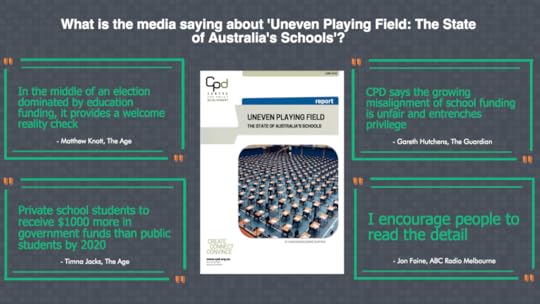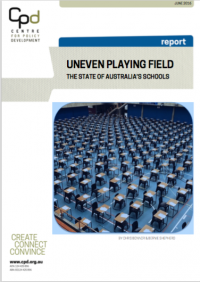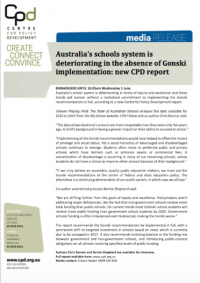Centre for Policy Development's Blog, page 39
June 23, 2016
CPD fellow Ian Dunlop joins call to declare a climate emergency
Former Shell executive and Australian Coal Industry Chair Ian Dunlop has joined a number of other prominent Australians to call on the Government to recognise the seriousness of the climate change threat by declaring a climate emergency.
In a public letter published in The Age on 23 June, the group says that an emergency speed transition to zero emissions is needed to begin the enormous task of safely drawing down the excess greenhouse gases already in the atmosphere.
To read more about the Climate Emergency Declaration and sign the petition, click here.
[image error]

The post CPD fellow Ian Dunlop joins call to declare a climate emergency appeared first on CPD.
June 8, 2016
Support CPD’s “$20 in 2016″ appeal!
Click here to help us remain a laboratory for long-term policy development
Our end of financial year appeal comes at a very uncertain time in Australian politics. Slogans and soundbites remain the campaign tools of choice in this Federal Election. We are experiencing an absence of genuine leadership and purposeful governance to get the nation going again. A huge appetite on all sides to win is trumping what Australians strongly wish to see: a well-reasoned, clearly-articulated policy agenda embracing the long term now. As a result, the role of CPD in developing evidence-based, long-term policy proposals is increasingly vital to our national conversation.
CPD is a policy institute with purpose and impact. We do not simply commentate on national affairs. Instead we actively develop and influence policy proposals for the Government’s consideration.
It has been an exciting year since our last appeal. We have revamped our governance processes, revitalised our fellowship network, introduced a fundraising committee, entered into partnership with several new organisational donors, moved to more suitable offices in Sydney and brought on former Secretary of Prime Minister and Cabinet Terry Moran AC as our chairperson.
We’ve also produced influential research and strong outcomes across all of our policy programs. Here are some of the policy highlights from 2015-16, and an indication of the work that is on its way over the next 12 months.
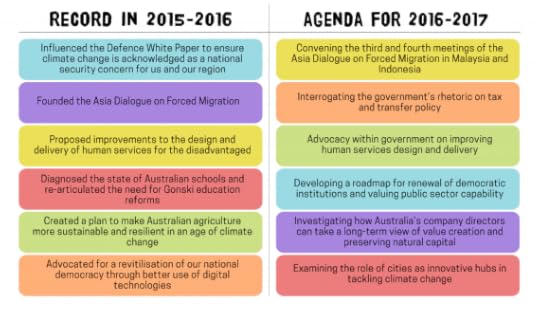 We are stronger than ever, with a growing influence, committed team, and clear purpose to drive our work. None of this is possible without the continued support of our individual ideas sustainers, donors and subscribers. With your help, we can continue to deliver exciting work across each of our research programs, strengthen our voice in policy debates and inform and influence experts and decision-makers inside and outside government.
We are stronger than ever, with a growing influence, committed team, and clear purpose to drive our work. None of this is possible without the continued support of our individual ideas sustainers, donors and subscribers. With your help, we can continue to deliver exciting work across each of our research programs, strengthen our voice in policy debates and inform and influence experts and decision-makers inside and outside government.
This year we are also offering the in-depth journalism of Schwartz Media as a free gift to say thank you. For every individual contribution of $20 or more, our donors will be able to choose a free two-month digital subscription to either The Monthly or The Saturday Paper.*
In this election year help put long-term thinking back into Australian politics – support CPD. Remember any donations made to CPD over $2 are tax deductible.
*Terms and conditions: This offer is for one subscription per donor, with a minimum donation of $20. This offer is valid to the close of the appeal. The digital subscription will take up 10 to 14 working days to process.

The post Support CPD’s “$20 in 2016″ appeal! appeared first on CPD.
June 1, 2016
Levelling the education playing field – media coverage of our latest report
CPD’s latest report Uneven playing field: the state of Australia’s schools and its call for a revitalisation of the Gonski agenda for needs-based school funding attracted widespread attention and coverage.
You can read and hear more about the report through the links below.
‘Federal aid for private schools to outstrip funding for similar state schools‘, Gareth Hutchens, The Guardian.
‘Private school students to receive $100 more in government funds than public students by 2020‘, Timna Jacks and Matthew Knot, Sydney Morning Herald/The Age.
‘Election 2016: Harsh truths for both sides on school funding, but we’ll just muddle on‘, Matthew Knot, Sydney Morning Herald/The Age.
Radio
Co-author Chris Bonnor discussed the report on Mornings with Jon Faine on ABC Radio in Melbourne.
TV
Chris also appeared on Channel 7’s The Morning Show on 2 June.

The post Levelling the education playing field – media coverage of our latest report appeared first on CPD.
May 31, 2016
CPD in Inside Story: fixing education and financing government in uncertain times
In recent weeks, Inside Story has featured long-form analysis from CPD on two policy issues that are crucial to the election campaign and for the long-term: the future of Australia’s education system, and the outlook for revenue and tax.
On 1 June, CPD fellow Chris Bonnor – co-author of our latest report Uneven playing field: the state of Australia’s schools – argued that without a recommitment to the priorities and principles that underpinned the Gonski Review, the gap between disadvantaged and advantaged schools and students will continue to grow.
“Australia is sleepwalking into a schools disaster. Steepening equity gradients will show even more clearly that differences in wealth, income, power and possessions, to use Gonski’s wording, will continue to pile up challenges for schools. Those who can will go on abandoning lower-SEA schools, further compounding the disadvantage. While changes won’t be dramatic, we can foresee a further widening of the achievement gap.
Increasingly, schools will not resemble their communities; they’ll instead cement a hierarchy that mocks the Australian egalitarian myth. We’ll continue to see disproportionate funding going to where it isn’t needed – rather than to students for whom it can make a difference. State and federal funding will continue to weave its inexplicable path…
A range of possible solutions exists. School choice should be shifted from one that provides a socio-educational advantage to some, at the expense of others, to choice that provides opportunities for all young people, many of whom are abandoning cookie-cutter mainstream schools to find that the others are much the same. The funding of needs has to be increased and far better coordinated to reflect the priorities arising out of the Gonski review. If the money can’t be found, then redistribution of existing public funding of schools will be back on the agenda.”
In April, CPD Policy Director Sam Hurley wrote that if the next government is serious about addressing challenges in education and a range of other key policy issues, we must move beyond a mindset that sees limiting the role and resources of government as a priority in and of itself.
“If Malcolm Turnbull meant what he said last September about respecting the intelligence of the Australian people, now would be a good time to level with them. And a good place to start would be the fact that tax receipts are going up. That’s a good thing, and it would be even better if the next government seized one of the many options to make that happen more efficiently and equitably.
Next, he could try something bolder, and revisit the bipartisan commitment to keeping Australia’s tax-to-GDP ratio at the lower end of OECD tables. Yes, we face tough trade-offs and choices. No, they are not as simple as choosing either higher tax or better spending, either “jobs and growth” or a decent safety net, or either a global economy or a thriving, fair society.
The public investments most threatened by a focus on shrinking government – hospitals, education, disability services and public sector capability – are precisely those requiring more revenue so that Australia can deliver growth and fairness at the same time. A bit more tax would be a small price to pay if higher revenue and better government sustain Australia’s social compact and ensure that the grand globalisation bargain sticks for the long term.”
For a full list of CPD’s most recent articles, opinion pieces and press releases, click here.

The post CPD in Inside Story: fixing education and financing government in uncertain times appeared first on CPD.
Uneven playing field: the state of Australia’s schools | REPORT | June 2016
Education is at once the great social mobiliser and the great leveller in our society. Educated citizens are safeguards in our democracy, and an educated workforce is vital to a productive, innovative and entrepreneurial economy. Education breaks the shackles of disadvantage and empowers those who live without privilege.
But how fair and accessible are Australia’s schools? Almost five years on since the Gonski Review, are we making progress?
CPD latest report, Uneven playing field: the state of Australia’s schools, takes a look at these questions. It is co-authored by CPD Fellow Chris Bonnor and Bernie Shepherd, who between them have 80 years of experience as NSW principals and education policy experts.
Examining key data from the My School website, the report shows:
Equity in our schools is declining - Family and personal background are having a greater impact on student achievement than is desirable in an open, accessible system like ours.
Students who have the means are shifting to different schools - Enrolment growth in more advantaged schools is growing strongly while enrolment growth in more disadvantaged schools is well below the national average.
A schools hierarchy is hardening along advantage/disadvantage lines - Disadvantaged students are increasingly concentrated in disadvantaged schools, and the educational challenges for these students are compounding as a result.
The local school is becoming detached from its surrounding neighbourhoods – The local public school is increasingly less representative of the local area because many students are attending school elsewhere. The connections the local school has with the community are breaking down.
Government funding is converging across government and non-government schools - Based on current trends, by 2016-17 the recurrent government funding that non-government schools receive converge with, then outstrip, that received by the public schools in a similar socio-economic range.
The report argues that the current government policies and funding arrangements are wholly unsustainable, and recommends four key things overall:
Revitalise Gonski - Policymakers should revising the findings and establish the mechanisms recommended by the Review – including a National Schools Resourcing Body to drive implementation of a Schools Resourcing Standard.
Level the playing field for schools and students – Federal and state governments to commit to full funding of all the Gonski recommendations as a high priority. If additional funding is not forthcoming, governments should rebalance the funding mix towards additional investment in schools with greatest need, regardless of sector. This should include a review of those schools where current finding levels are much greater than for other schools with similar enrolment profiles, differ markedly from other schools with similar enrolments, and a hold in growth in public funding for non-government schools pending a review of how funding is distributed and what obligations should accompany public funding.
Restore the local school - Policy should focus on maximising opportunities for all children to enrol and succeed in their most accessible local school.
Reduce the impact of disadvantage on student outcomes – The clear relationship between social disadvantage and poor educational outcomes – driven in part by separation of students with socio-educational advantage – must be addressed as an urgent priority. Incentives available to certain schools to aggregate advantage should be progressively reduced, and the capacity of less advantaged schools to offer excellent education to all students and families in a community must be increased.
You can read both the full report and the press release here.
Key links

The post Uneven playing field: the state of Australia’s schools | REPORT | June 2016 appeared first on CPD.
May 25, 2016
One year after the Andaman Sea refugee crisis – is the region better prepared?
In May last year, the discovery of mass graves on the Thai-Malaysia border and stranding at sea of around 8,000 people fleeing Myanmar and Bangladesh cast the spotlight on the grave reality of forced migration in our region.
The regional response was sorely inadequate. Boats were intercepted by Thai, Malaysian and Indonesian authorities, and reportedly pushed back out to sea. Smugglers and traffickers abandoned boatloads of asylum seekers, many of whom were without food or water. Some were saved by local officials or fisherman, or swam to shore. 370 people are known to have died. After several weeks, a one-off meeting convened by the Thai Government finally helped to provide a stop-gap resolution for the immediate crisis – but only after the muted capacity of regional institutions and architecture to deal with displacement crises had been tragically exposed.

One year on from the crisis, there are promising signs that the region has learned from its collective failure to act, and that it is building the processes and policy frameworks needed to improve regional responses to forced migration in the future. Significantly, the March 2016 meeting of Bali Process Ministers agreed to conduct a formal review of the Andaman Sea crisis, and to create a new regional response mechanism that allows senior officials to consult and convene meetings in response to irregular migration issues or future emergency situations. These reforms drew on ideas generated by the Asia Dialogue on Forced Migration.
This week, CPD and our regional co-conveners of the Asia Dialogue on Forced Migration are publishing a two-part series on the lessons of the Andaman Sea crisis and what they tell us about developing effective, durable and dignified approaches to forced migration in the future.
Part One: The Andaman Sea crisis a year on – what happened and how did the region respond?
Part Two: The Andaman Sea refugee crisis a year on – is the region better prepared?
The third meeting of the Asia Dialogue on Forced Migration will be held in Kuala Lumpur in September 2016. Read more about the outcomes of the first two dialogue meetings and the objectives of the dialogue here: http://cpd.org.au/intergenerational-w...

The post One year after the Andaman Sea refugee crisis – is the region better prepared? appeared first on CPD.
March 22, 2016
CPD Fellow Chris Bonnor on disadvantage in our school system
On Tuesday 29 March, CPD fellow Chris Bonnor and his research partner and co-author Bernie Shepherd will release School Daze: What My School really says about our schools.
Using data available through the My School website, School Daze is a booklet that analyses the state of the Australian education system, and seeks to challenge commonly-held beliefs about schools and school performance in ways which might contribute to a better debate.

The authors examine various socio-educational challenges currently being faced by our primary and secondary schools, and warn that we are at risk of creating a two-tiered school system.
Chris and Bernie have extensive expertise in educational policy. Amongst their various other qualifications, they are retired school principals with a combined 80 years experience in education.
School Daze was featured on the ABC’s Lateline on 22 March. You can watch the segment on My School findings here, and a follow up interview with NSW Education Minister Adrian Piccoli here.
School Daze will be available on the CPD website and elsewhere from 29 March.
Mr Bonnor says disadvantaged schools struggling to lift student outcomes need to be targeted with #Gonski funding: pic.twitter.com/ZCBflP50iO
— Lateline (@Lateline) March 22, 2016

The post CPD Fellow Chris Bonnor on disadvantage in our school system appeared first on CPD.
March 18, 2016
CPD welcomes Terry Moran AC as new Chairperson
Today CPD is delighted to announce that Terry Moran AC will become our new Chairperson.
Terry brings unrivalled depth of experience in making long-term public policy for Australia. His record speaks for itself – not least his time as Secretary of the Commonwealth Department of Prime Minister and Cabinet from 2008 to 2011. Terry will be the second former PM&C Secretary to lead our board, following CPD’s founder and inaugural chair John Menadue.
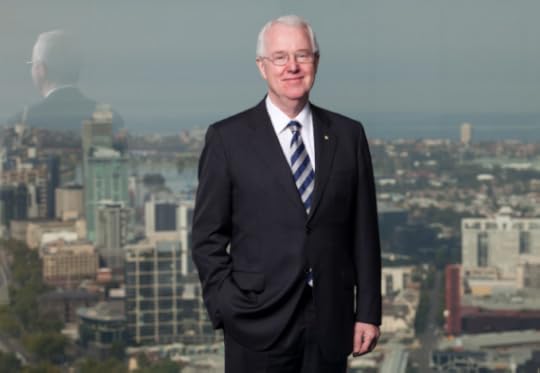
Terry has followed CPD’s activities with great interest over several years. He is motivated by the challenge of helping CPD to expand its policy expertise and influence, working alongside CPD’s core team and the talented and passionate members of our Board, Research Committee and Fellowship.
“I am delighted to join CPD when the need for a thoughtful focus on Australia’s long term future and our evolving national interest is greater than ever.”
“CPD fills a vital space in Australian policy life, demonstrated by the success of its Asia Dialogue on Forced Migration and its recent work on public sector capability and climate security. I want to help CPD continue to grow and share my experience in policy development with CPD’s foresight on the key policy challenges of this century. These include ensuring effective government, expanding opportunity and social justice, building a sustainable economy, and embracing Australia’s role in the Asia.” Terry Moran AC
Press release: Terry Moran AC joins CPD as Chair
With Terry’s stewardship, we look forward to building on strong momentum in the Asia Dialogue on Forced Migration, our climate security policy development, and our work on public sector capability and services for Australia’s most vulnerable people. His insights and those of our broader community of experts will also be crucial to driving new work for 2016, including research on the role of business in creating sustainable value for the community.
Media coverage
Terry spoke with the Australian Financial Review’s Political Editor Laura Tingle about the importance of long-term policy development and his ambitions for CPD: Terry Moran’s insider view of how governments stuff things up.
Terry will also be discussing his appointment on RN’s Late Night Live with Phillip Adams on Monday 21 March.

The post CPD welcomes Terry Moran AC as new Chairperson appeared first on CPD.
March 17, 2016
Defence White Paper marks a step forward in climate security debate
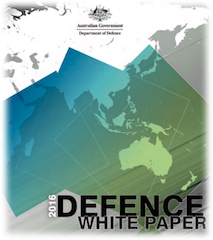 After much deliberation and delay the Turnbull Government released its Defence White Paper on 25 February 2016. Initial reactions to the White Paper from security experts and the media focused on spending promises, new kit, increased arms capability and reactions from China.
After much deliberation and delay the Turnbull Government released its Defence White Paper on 25 February 2016. Initial reactions to the White Paper from security experts and the media focused on spending promises, new kit, increased arms capability and reactions from China.
We’re pleased to say the White Paper took an important step by clearly acknowledging climate change has national security consequences for Australia. There are several explicit references in the White Paper (pp. 16, 41, 48, 55-56 and 102). The references deal mainly with the climatic challenges confronting our South-East Asian and South Pacific neighbours, and how our defence estate must adapt to sea level rises and extreme weather.
With climate change back on the agenda, the next focus point is the Implementation Strategy for the White Paper due at the end of March. It will be interesting to see how the Government’s rhetoric and commitments – which include spending over $440 billion on defence in the next ten years – are translated into tangible action for the coming decade, including on climate security.
When we wrote The Longest Conflict our interviews with Defence officials indicated climate change wouldn’t be mentioned at all. Our report reinforced how regressive a step that would have been. Thankfully that has been averted, thanks to the work of many organisations and committed individuals, including in particular those within Defence who have been agitating for this for some time. We’re pleased to have been part of these efforts and will continue to work hard to ensure the other recommendations in The Longest Conflict are advanced.
CPD’s work has been acknowledged by the report of the Defence White Paper Expert Panel (see p. 30). You’ll be familiar with the coverage of The Longest Conflict itself. Since the release we’ve briefed the Chief of Army, Chief of Navy, other members of Defence, DFAT and Intelligence, and those part of the White Paper drafting team on our findings. Climate-induced displaced is now also an important focus of the Asia Dialogue on Forced Migration, which we lead. A report on the second Dialogue meeting in Bangkok is available here.
Also, here is some related coverage of the White Paper and CPD’s contribution.
If you are interested to understand why tackling climate security challenges is so important, feel free to read CPD Director Rob Sturrock’s recent work on climate security:
Australia’s peace threatened by climate change, June 22 2015
Too little, too late: Australia still missing from serious climate change debate, 14 August 2015
Deepening Australia’s regional relationships through climate security, 10 December 2015
Defence White Paper must acknowledge Australians’ attitude on climate change, 19 February 2016
You can also access the CPD report, The Longest Conflict: Australia’s Security Challenge and the ensuing media coverage here.

The post Defence White Paper marks a step forward in climate security debate appeared first on CPD.
March 9, 2016
CPD Fellow Ryan Goss talks to ABC News 24 about the same-sex marriage plebiscite
This week, ANU constitutional law expert and CPD fellow Ryan Goss spoke to ABC News 24 about the history of plebiscites in Australia, and the options available to the Government for its proposed vote on marriage equality during the next term of parliament.
“When it comes to a referendum, we have a great deal of information in the Constitution about how a referendum works, and when a referendum is required”, Ryan said. “When it comes to a plebiscite though, pretty much everything is up for grabs.”
Watch the full video below.
How will a plebiscite on #marriageequality work? @GregJennett asks @RyanGoss on #CapitalHill #auspol #ssm https://t.co/bd9cENJInW
— ABC News 24 (@ABCNews24) March 7, 2016

The post CPD Fellow Ryan Goss talks to ABC News 24 about the same-sex marriage plebiscite appeared first on CPD.
Centre for Policy Development's Blog
- Centre for Policy Development's profile
- 1 follower



